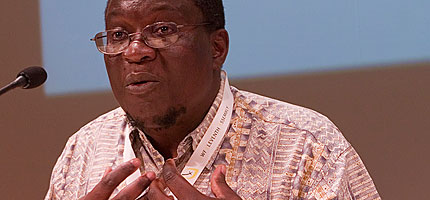Mennonite World Conference President Danisa Ndlovu of Zimbabwe says Mennonites are committed to the long-term process of telling and reshaping the story of Lutheran-Mennonite relations. © LWF/Erick Coll
23.07.2010
Peacemaking Action Between Lutherans and Mennonites Heals Wounds
Mennonites Will Now Reshape the Telling of Their Story
STUTTGART, Germany, 23 July 2010 – “When you have wound, it can be cured. What we did yesterday was more than curing a wound – it is healing,” said Rev. Dr Ishmael Noko, General Secretary of the Lutheran World Federation (LWF) at a press conference today. He was referring to the public act of reconciliation between Lutherans and Mennonites that took place here at during the Eleventh Assembly of the LWF. “Curing and healing are different from each other,” the General Secretary said. “Healing occurs at a deeper level. Yesterday we healed memories. You don’t shed tears unless something in your soul is moved – and that happened yesterday.”
In the adoption of a statement entitled, “Action on the Legacy of Lutheran Persecution of Anabaptists,” Lutherans yesterday repented for violent persecution of Anabaptists and for the ways in which Lutheran reformers supported persecutions with theological arguments. Ironically, Mennonites have become known for being pacifists and peacemakers and for adopting non-violent approaches to conflict situations.
General Secretary of the Mennonite World Conference and Co-Secretary of the Lutheran-Mennonite International Study Commission, Rev. Dr Larry Miller, said that over the past decades Anabaptist and Mennonite communities have widely adopted mediation and conflict-resolution processes. “There is a strong focus on non-violence and constructive peacemaking,” he told reporters.
President of the Mennonite World Conference, Rev. Dr Danisa Ndlovu said that yesterday’s peacemaking action between Lutherans and Mennonites “speaks to the whole concept of how we look at each other”. He said that the action opened the way for the two churches to work in collaboration “after generations of divisions have rendered us incapacitated.”
The telling and retelling of the martyr stories and the expectation that followers of Christ should expect opposition from the world plays a vital role in the identity of Mennonites, Miller said. He referred to The Martyrs Mirror, a massive sixteenth-century volume which records accounts of martyrdom. While history cannot be changed, Miller said, the way that history is communicated can be. He said that Mennonites have committed themselves to telling their common understanding of history in new ways. “We will reshape the telling of the story,” he said. “We will say that the Lutherans asked us for forgiveness and we forgave them.”
Miller said that there has been “a natural feeling” within the Anabaptist-Mennonite communities “to feel like victims.” But he said that “the dominant sense” of the Mennonites who participated in the peacemaking action yesterday was of gratitude for what the Lutherans had done. “It is a significant change, moving us from a feeling of being recipient victims to a feeling of gratitude. This will lead to a change of attitudes.” (513 words)

